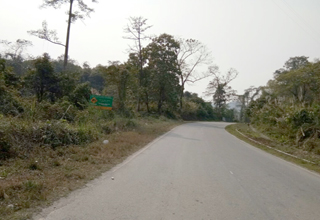
[ Tongam Rina ]
ITANAGAR, Mar 11: The natural elephant corridor at Dadzu-Lumia or Dadzeeling between Tippi and Bhalukpong in West Kameng district is under threat because of rampant encroachment and proposal by the Indo-Tibetan Border Police (ITBP) to establish a permanent camp.
Some weeks ago, the Forest department started plantation on the encroached land, halting the encroachment for the time being.
The corridor, traditionally known as “Jowa Olgu Fow” (Burnt Rice), a sacred land of the Hrussos (the local community) is a critical linkage between the elephant habitats of the Pakke Tiger Reserve and Doimara Reserve Forest.
During winters, when the volume of water in the Kameng River decreases, the elephants cross the river near Dhuwang Nallah before they move on to Doimara Reserve Forest area.
Forest officials say that human interference in the natural corridor will inevitably lead to human-elephant conflict, as the elephants are known to frequent its natural corridor.
However, the locals say that they are left with no option other than handing it over to the ITBP as the Forest department has not been able to secure it from encroachment.
Locals say that they will leave up to 500 metres of the corridor untouched for free movement of the elephants.
To support their claim over the land, the Hrussos say that the place was named JowaOlgu Fow after granaries were burnt following a feud with Khusum Buso, a neighbouring tribe in the 15th century.
“The land is traditionally ours. One can go back to the history of the area which goes back to as far as the 15th century. It is our community land and the Forest department came much later. Till 1973-74, the area was the winter resort of our queen Lumum Dususow”, says one of the leaders of the community.
The ITBP wants to take over the area covering the natural corridor. The ITBP wants more than 70 hectares of land that encompasses the entire corridor which will include a firing range. The forest department has shot down the land clearance proposal but the villagers are keen that the ITBP camp actually comes up as it will stop encroachment altogether.
The Bhalukpong administration and the forest department had earlier cleared the encroachment, mostly jhum cultivation. The locals say that encroachment continues even after the intervention of the government departments.
The Forest department in Tippi says that there has been numerous times when the elephants have destroyed jhum fields and construction that within their corridor.
The department fears that if the natural corridor is disturbed, the animals might venture into Tippi and Bhalukpong townships, adjacent towns near the corridor.
Elephants moving through the area had been entering human settlements in the nearby villages of Ramda, Khuppi and Kimi, causing damage to property and posing a threat to human lives, according to a report “Right of Passage”, published by the Wildlife Trust of India, released in August 2017.
According to the Elephant Census Arunachal Pradesh, 2015, there are 134 elephants in the Pakke Tiger Reserve, while another 115 are in Khellong Forest Division.
According to the Right to Passage report, cultivation inside the corridor forest is a severe threat to the elephant habitat and the connecting corridor forest. A large part of the corridor area, on both sides of NH 229 is under cultivation. Expansion of the Upper Bhalukpong and Tippi villages and emerging temporary settlements (encroachments) towards the corridor area are other major threats to the corridor that is cited in the report.
Boulder extraction from the Kameng River near the corridor is another issue that has been noticed by the report. Though the West Kameng district administration has put a halt to boulder extraction, it continues because of the construction of NHPC’s Kameng project.
Earlier, elephants would cross the KamengRiver near Tippi village, Tippi Forest Range Office and the Orchid Research Centre. However, the route has almost been chocked with encroachments. Since the last five years, elephants cross the highway near the DhuwangNallah.
In the last few months encroachment has been stalled by the administration, but it cannot be ruled out.
According to the WTI, in Tippi corridor, elephant-human conflict claimed two human lives in 2004 and 2005, while in 2013 the steel gate of the Orchid Research Centre was damaged by elephants.


